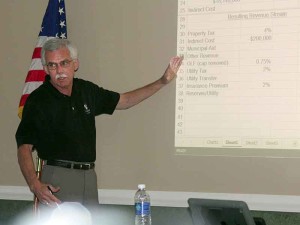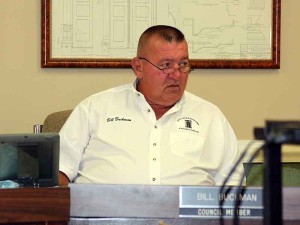Council looking to higher occupational tax rate instead of creating new taxes
By JIM BROOKS
Nelson County Gazette / WBRT Radio
Tuesday, Aug. 11, 2015, 11 p.m. — Workers with jobs inside the Bardstown City limits will see a little less take home pay in their paychecks in the near future — just how much less remains to be seen.

Councilman Fred Hagan shows the council a spreadsheet and how various combinations of tax hikes and new taxes can fund the city’s general fund while reducing the need for transfers of revenue created by the city’s six utilities.
The Bardstown City Council reviewed its options Tuesday night to provide general fund revenue in a manner that relies less on transfers of revenues generated by the city’s six utilities.
Larry Green, the city’s assistant administrator, said during a presentation last week that it wasn’t fair to use the utility revenues to fund the general fund. The general fund pays for services that do not generate review, which includes — police and fire protect, recreation and street maintenance.
Using utility revenue for general fund expenses isn’t fair because not all of the city’s residents use the city’s utilities, particularly the city electric, which generates the most revenue. In effect, residents in neighborhood served by the city electric are — through their utility bills — paying for services that non-utility subscribers also use.
Councilman Fred Hagan used a spreadsheet displayed on the meeting room wall to show the rest of the council how the options for funding the general fund that will reduce the use of utility revenues.
Hagan said his preference was to use all the revenue sources the city has at its disposal — taking the 4 percent property tax revenue increase as allowed by law; raising the occupational tax from 1/2 to 3/4 of a cent; establishing a 2 percent utility franchise tax (charged to those who use non-city utilities); and creating a new 2 percent insurance premium tax charged to city residents who purchase insurance policies.

Councilman Bill Buckman discusses tax revenue options during Tuesday’s Bardstown City Council meeting.
This tax revenue mix would not eliminate utility revenue transfers, but would reduce them significantly, Hagan explained.
The members of the council listened patiently, but each expressed reservations at the suggestion of raising property taxes or creating new taxes.
Councilman Bobby Simpson said he supported raising the occupational tax from .5 to .75 but not raising property taxes or creating a new insurance tax or utility franchise tax.
Simpson defended the use of utility revenues for funding part of the general fund expenses.
“We’re in business and it makes money, why not use it?” he asked. Hagan said that keeping utility revenues dedicated to utilities may lead to a reduction in utility rates.
Councilman Roland Williams said he concurred with Simpson’s comments.
Councilman Bill Buckman said he supported raising the occupational tax to 1.25 and eliminating new taxes and possibly lowering the property tax rate.
Councilwoman Kecia Copeland said she didn’t support raising one tax rate and then lowering property taxes, and she was definitely not in favor of new taxes.
The city’s utility revenue is one of the benefits of municipally owned utilities, Councilman Francis Lydian told the council. None of the cities that Green has compared Bardstown to when discussing tax revenue have six utilities that generate revenue the way Bardstown does.
“That’s why they had to have all those taxes,” Lydian said, referring to the insurance premium tax and utility franchise tax that Bardstown does not have.
“Many families in this city are struggling to make ends meet,” Lydian said. “We have small businesses that are struggling, and school children with side jobs trying to save money to go to school, buy a book or buy some clothes.”
With the majority of the council having rejected the insurance tax and utility franchise tax, Hagan said the decision will boil down to the occupational tax rate the council decides will provide adequate funding.
The discussion on a new occupational tax rate will taken up at the next council meeting on Aug. 25.
TOP COP HONORED. At the start of the meeting, Mayor John Royalty recognized Police Chief Rick McCubbin, who was selected last week as “Top Cop” — the 2015 Kentucky Police Chief of the Year — by the Kentucky Association of Chiefs of Police.
“I’m very pleased he’s my chief,” he said.
In other business, the council:
— approved first reading on two rezoning requests for property on West Stephen Foster Avenue in the Maple Hill neighborhood. The properties — located at 815 W. Stephen Foster and 813 W. Stephen Foster — are homes that apparently were zoned B3 Business. The requests are to change their zoning to a more appropriate R1C single family residential.
— approved using the council’s contingency funds to pay the cost for eight Neighborhood Watch signs for the Maple Hill neighborhood. The signs will cost $326 plus the city labor to install them. Buckman praised the neighborhood residents for starting a watch program, saying that perhaps other neighborhoods will also get involved.
— recognized two Bardstown Police officers for their service to the community — McKenzie Mattingly for five years of service, and Glenn Wheatley for 15 years of service.
— thanked American Legion Post 42 for their work to refurbish the howitzer that was on display at the Veterans Memorial on East Broadway.
NEXT UP. The council next meets at 7 p.m. Tuesday, Aug. 25 in the council chambers in the city hall annex on Xavier Drive.
-30-








